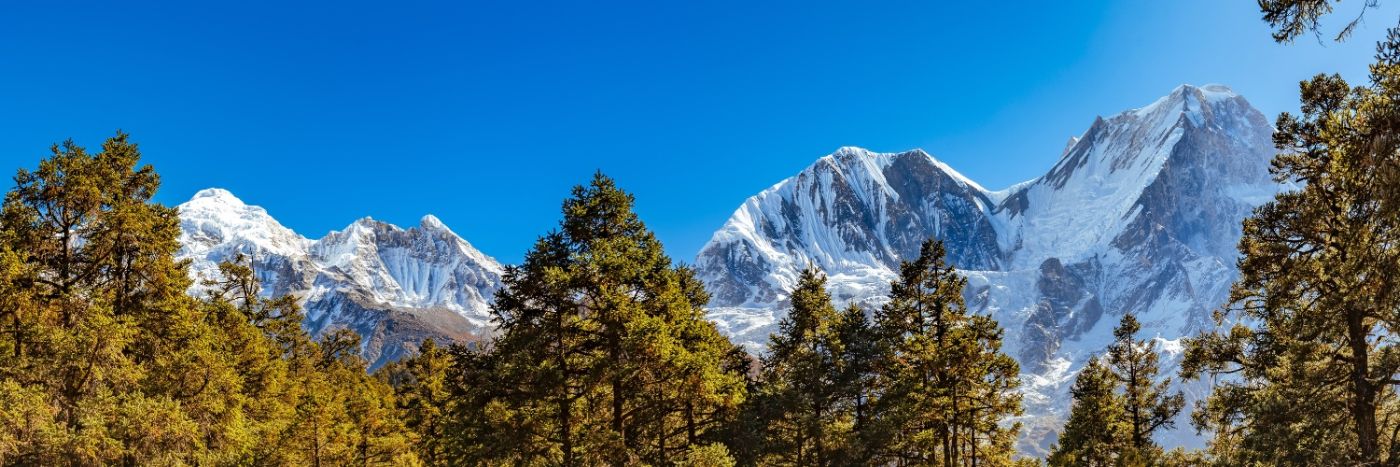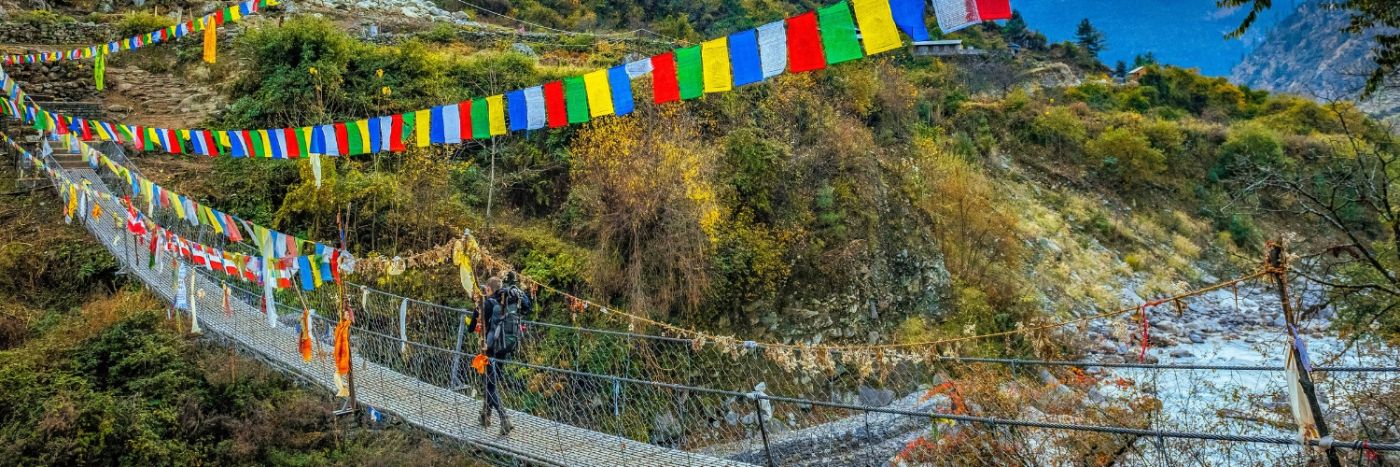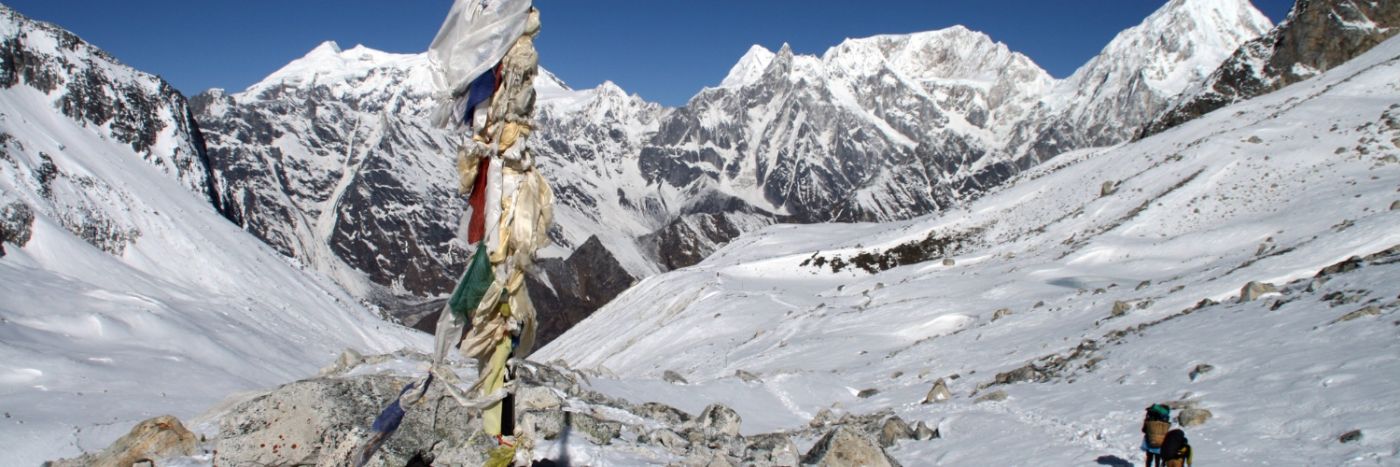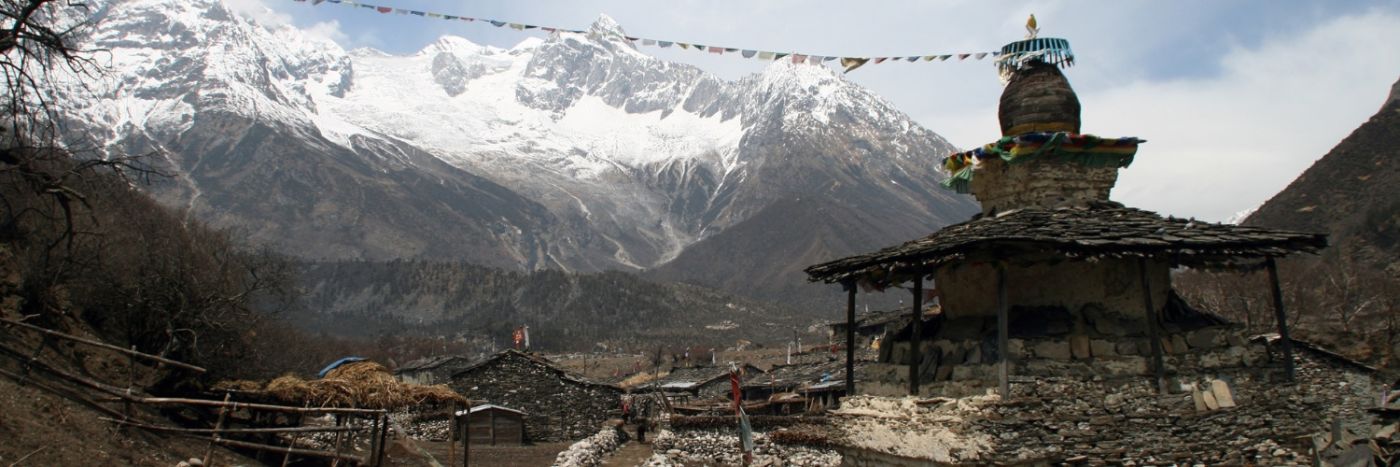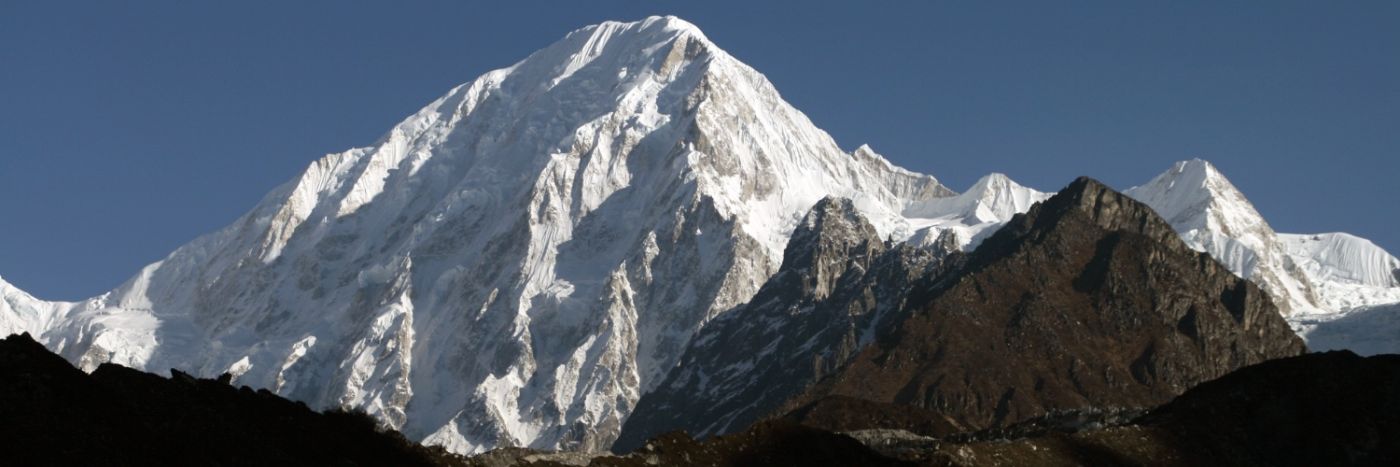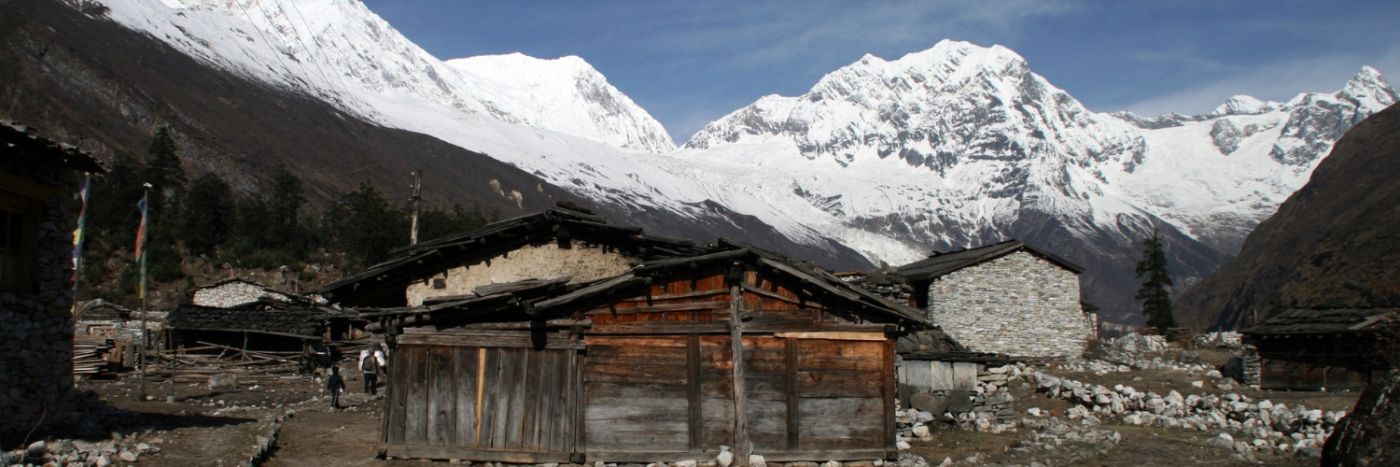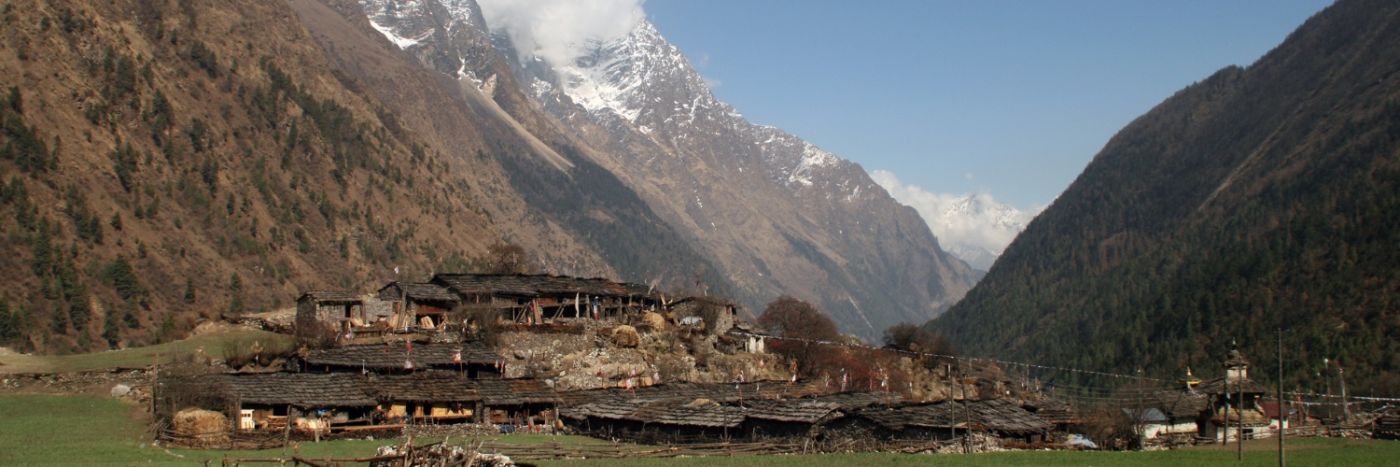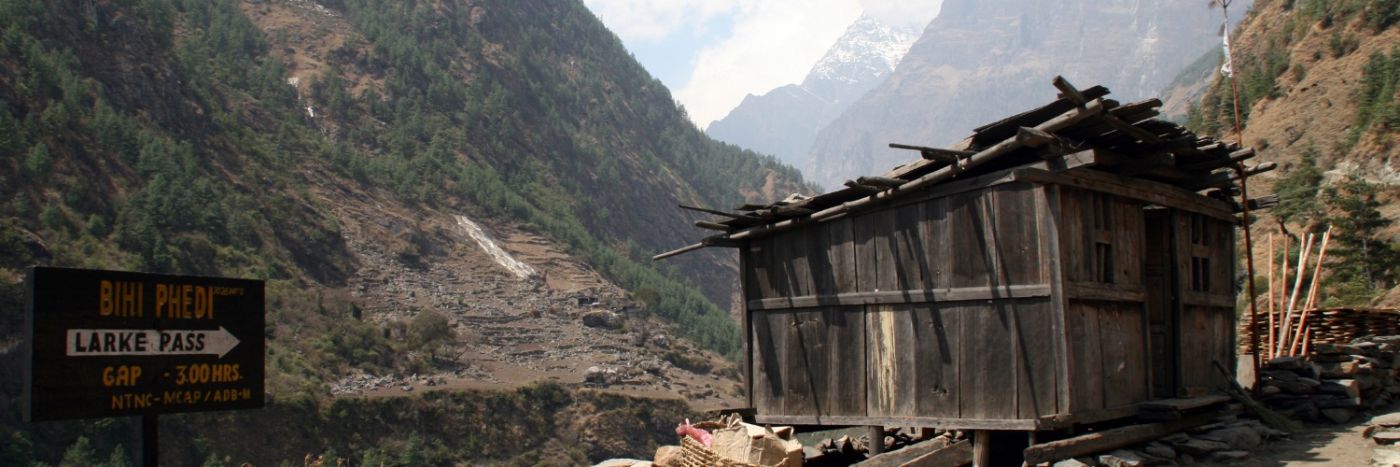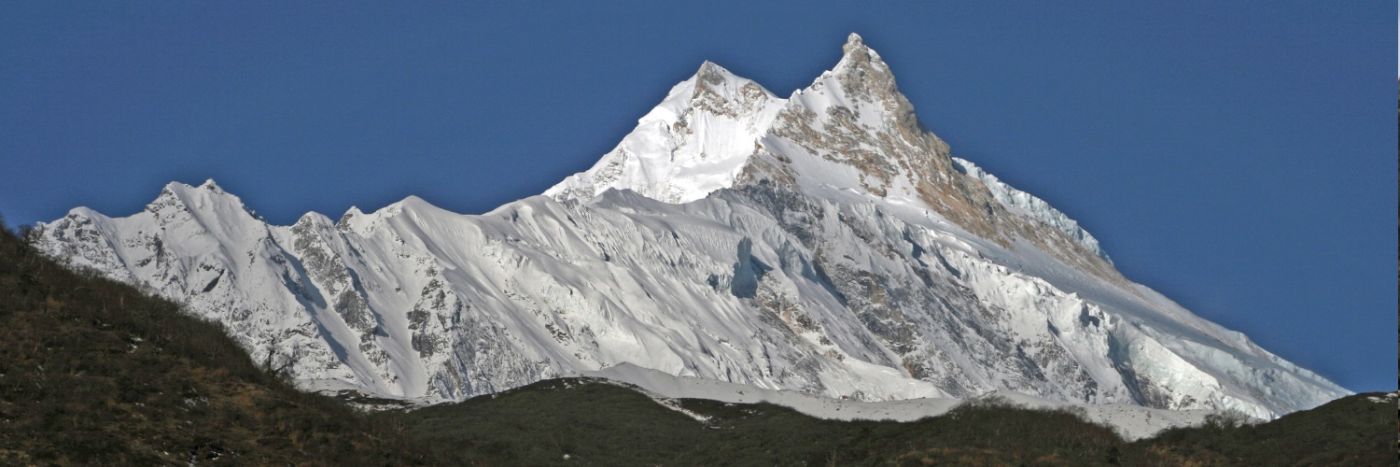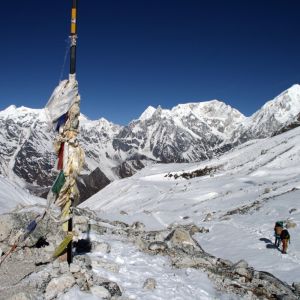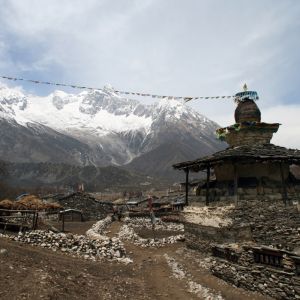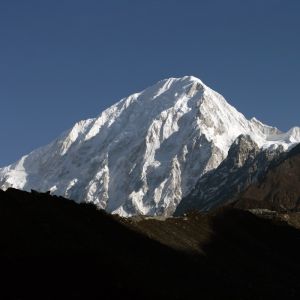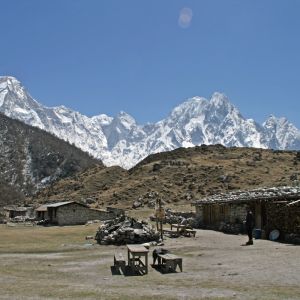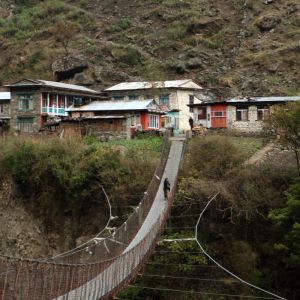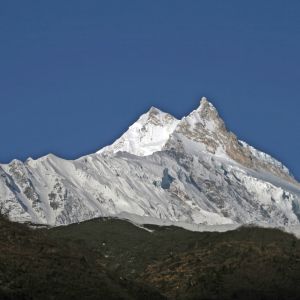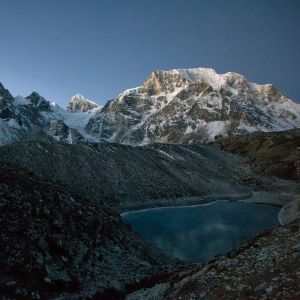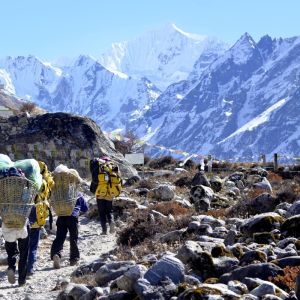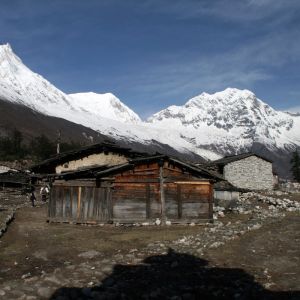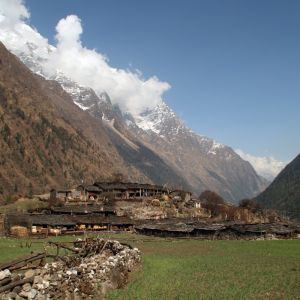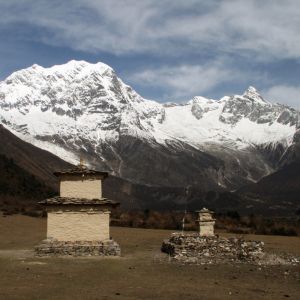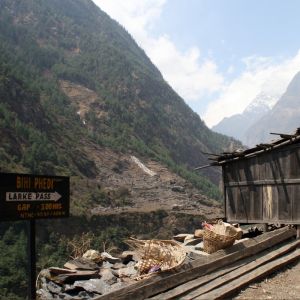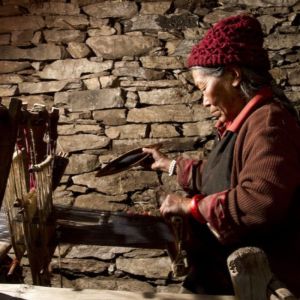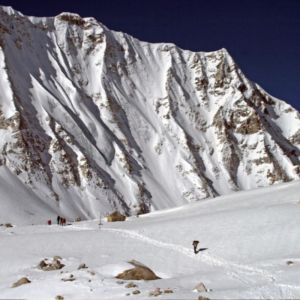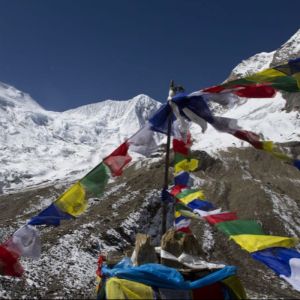- Overview
- Map & Itinerary
- Essential Info
- Pics & Vids
- Dates & Prices
Highlights
- Trek in the shadows of the eighth-highest mountain on Earth, Manaslu (8156m), the Mountain of the Spirit
- Take on the more remote, wilder and less trodden circuit of Manaslu which few have experienced
- Marvel at the spectacular views of Himalayan giants whilst trekking amidst the notable 7000’er peaks of Ngadi Chuli, Himalchuli and Shringi Himal
- Follow the route of ancient salt-trading trail which, even today, is used more by merchants and Buddhist monks than western trekkers
- Carefully crafted itinerary for acclimatisation to cross the high pass of Larkya La at 5,100m
- Experience life in isolated villages where the Tibetan culture remains unspoilt
- Enjoy breathtaking scenery, especially the last few days of the trek as you reach heights of above 5000m while crossing the Larkya La Pass
- Supported by our incredible Sherpa team whom we’ve been working with for over 15 years
- Savour the Nepalese way of life that has barely changed for thousands of years
- Take in the enigmatic capital city of Kathmandu with a local guided tour
- Receive a complimentary Water-To-Go bottle when you depart on this trip to minimise our plastic foot-print in Nepal.
Overview
Trekking in the shadow of the eigth highest mountain in the world Mount Manaslu (8,156 meters), this is the perfect trekking alternative to the neighbouring Annapurna Circuit and the popular Everest Base Camp. It has equally spectacular Himalayan scenery, an abundance of wildlife and tea house accommodation, but sees far fewer trekkers and stretches of road. Manaslu means “Mountain of the Spirit” and was named after the Sanskrit word Manasa meaning “intellect” or “soul.”
The route is known for its stunning mountain views, diverse landscapes, and unique cultural experiences. Starting in the town of Maccha Khola it takes you through remote villages, lush forests, and up steep mountain passes before reaching the summit of Larkya La Pass (5,135 metres). Whilst the mountain scenery is nothing short of spectacular, as you rise higher, there is also a distinct change in culture. In the lower farming areas the people are Nepali of Indian origin, however, as the trek progresses you move into the Nupri Region, where villagers are descendants of Tibetan immigrants. Along the way, you will have the opportunity to interact with locals from the ethnic groups of Gurung, Tamang, and Tibetan, and learn about their culture and way of life.
Our trek takes 12 days to complete and requires a good level of fitness. There are early starts, steep ascents and dhal bhat aplenty. Our itinerary has been carefully crafted with our local Nepalese operator whom we have been working with for over 15 years.
Due to its remote location and off-the-beaten-path experience, the Manaslu Circuit Trek requires a special permit from the government of Nepal. It is important to obtain the necessary permits and follow the local rules and regulations to ensure a safe and enjoyable trekking experience.
Other trip highlights include a guided tour of Kathmandu where you can visit hindu and buddhist temples, winding your way back through the hippie haven of Freak Street, taking in the sights, sounds and smells of spices along the way.
If you are truly in search of adventure, tranquility, and breathtaking landscapes, our 16 day Manaslu Circuit is the perfect trek in the Himalayas.
Arrival in Kathmandu
Arriving at Tribhuvan International Airport in Kathmandu on the nominated flight time, you’ll be met and receive a private transfer for the short distance into central Kathmandu to the Kathmandu Guesthouse Hotel in the heart of the Thamel district. You’ll be given a briefing on your forthcoming adventure, and in the evening can take dinner at your leisure in one of the many choices of cafes & restaurants in Kathmandu, although the open air courtyard cafe of the KGH Hotel is as a great option.
NB: A special permit is required for this trek. In order for us to obtain permits for you, we have to present hard copies of your passport, 2 passport sized photos and travel insurance details. One full working day is required for processing.
Included
Accommodation: Kathmandu Guesthouse Hotel
Meals: None
Kathmandu
A trip to Nepal isn’t complete without experiencing the enigmatic capital city of Kathmandu. A hotbed of culture, cuisine and creativity. Whilst waiting for your trekking permit to come through you can enjoy a guided tour of major historical and cultural landmarks of the Kathmandu namely Pashupatinath – a holy Hindu temple. Bodhnath – the biggest ‘stupa’ in the world, and Swayambhunath – aka Monkey temple.
To finish the day you’ll head on to Kathmandu Durbar Square, the old part of the town famed for it’s many centuries old temples, market squares and the ‘Hippie’ haven of Freak Street. You’ll head back to the hotel via an interesting walk through the vibrant and chaotic backstreets and spice markets.
Included
Accommodation: Kathmandu Guest House
Meals: Breakfast
Drive from Kathmandu to Machha Khola (930m l approx 7 hours)
After an early breakfast it’s a full day’s drive west from Kathmandu to Machha Khola via the Prithvi Highway.
Before reaching the town of Malekhu you’ll head north taking the single track road to Dhading Besi and beyond to Arughat, Soti Khola and then the destination of the day – Maccha Khola.
As you divert off the main highway, the road condition starts to gradually deteriorate as you follow the Budi Gandaki river valley.
Included
Accommodation: Basic Teahouse
Meals: Breakfast
Transport: Private Transfer
Trek to Doban (1070m l approx 5 hours)
Welcome to the trek start! This is a stunning introduction to the Manaslu Trek as the trail is undulating, crossing streams and rocky ravines to reach Khola Besi. There is a beautiful hot spring not badly timed for lunch. The afternoon will see you navigate the first of many suspension bridges taking the group to the eastern bank and to our accommodation at Doban.
Included
Accommodation: Basic teahouse
Meals: None
Trek to Phillim (1570m l approx 6 hours)
After breakfast your route starts off on a steeply rising rocky trail, skirting landslips in an increasingly harsh and inhospitable landscape pressing on up to Yara Khola. Your next destination of the day, Jagat, is reached by a long suspension bridge leading you to the designated Manaslu Conservation Area. You’ll see the white façade of Shringi Himal (7187m) looming large ahead. Brace yourself for the slog up to Phillim where you’ll stay for the night.
Included
Accommodation: Basic teahouse
Meals: None
Trek to Deng (1860m l approx 4 hours)
You’ll start to feel a sense of magnitude of the sheer scale of the Himalaya.
Crossing the Budhi Gandaki river, where the undulating trail hugs the edge, you’ll eventually drop back down to the river again where the crystal clear Shar Khola cascades into the Budhi. The trail flattens out here, winding through beautiful bamboo forest to the day’s destination of Deng Khola, and into the Deng settlement itself.
Included
Accommodation: Basic teahouse
Meals: None
Trek to Namrung (2540m l approx 6.5 hours)
Leaving Deng you’ll once again cross the Budhi Gandaki river, following an uphill trail to Rana. Zigzagging past the little monastery of Shringi you’ll see prayer flags and inscriptions carved on mani stones – a form of prayer in Tibetan Buddhism.
Crossing the amazing Shringi Khola suspension bridge, you can take a break at Ghap and recharge with lunch. Heading west you’ll cut across fields leading to dense mixed forest of conifers and juniper, complete with birdlife and monkeys. The trail continues above the river with a strenuous climb through woods to finally reach Namrung.
Included
Accommodation: Basic teahouse
Meals: None
Trek to Lho (3020m l approx 4.5 hours)
The area has a noticeable Tibetan influence, characterised by closely built stone houses that resemble apartments and share a common flat roof and courtyard. As you ascend, the trail passes by a mani wall, fields and the villages of Barchham and Lihi. Continuing your climb, to reach Sho village, which is also composed of stone houses. As you gain altitude, the mountain vistas become increasingly breathtaking, with Manaslu, Himalchuli, Saula Himal, and Dwijen Himal towering on either side of the trail. Crossing a small ravine, you’ll arrive at Lho, an important village with a monastery and a Lama school. The school accommodates around 80 – 90 resident scholars who are inspired by the magnificent view of Manaslu.
Included
Accommodation: Basic teahouse
Meals: None
Trek to Samagaon (3390m l approx 4 hours)
After a steep descent and crossing the rocky Thusang Khola, you’re greeted by the dominating presence of Manaslu and Himal Chuli. Continuing along the trail, you’ll pass the glacier-fed Numla Khola river where the valley gradually descends into a moraine. Here you’ll be just a few kms away from Tibet, following the ancient trans-Himalayan trail. Your day’s destination: Samagaon, a renowned Lama settlement that embodies the essence of Tibetan culture.
Included
Accommodation: Basic teahouse
Meals: None
Trek to Samdo (3690m l approx 3 hours)
Today is a gentle and shorter trek to help with acclimatisation and takes you along a shelf above the river that passes juniper and birch forests in Kermo Kharka. Drop down and cross the Budhi Gandaki river on a wooden bridge, and then ascend onto a headland between two forks of the river for the final push to Samdo.
Samdo is recognised as a Tibetan refugee village, conveniently located just a day’s walk away from the border, making it an accessible route for Tibetans seeking to enter this village discreetly.
Included
Accommodation: Basic teahouse
Meals: None
Trek to Dharamsala (4460m l approx 3 hours)
The day’s walk starts easily enough as you cross the Budhi Gandaki river for a final time and pause at the old stone wall of mani inscriptions bidding you well for your journey over the pass. The trail gradually rises through juniper and tundra with a viewpoint overlooking the Larkya La glacier. Climbing further you’ll arrive at the memorable Spartan Larkya Rest House. Another short day to allow you time to acclimatise and rest.
Included
Accommodation: Basic teahouse
Meals: None
Trek to Bimtang (3590m l approx 8 – 9 hours)
Following your two shorter trekking days, today sees you tackle a longer yet very rewarding day. You’ll pull on your boots early to avoid the gale force wind which usually increases after midday at the pass.
After a long gradual climb alongside a moraine, you’ll make a short descent to a glacial lake and reach the head of the moraine at 4700m: this has to be crossed in order to reach the top. Four frozen lakes lie below and then it is up, up, up to the Larkya La pass at 5100m. The reward for these difficult trekking conditions is brilliant westerly views of Himlung Himal, Kangurru, and Annapurna II as well as the looming omnipresence of Manaslu. You might want your walking poles handy today as the descent isn’t any kinder with a 650m descent in less than an hour.
Included
Accommodation: Teahouse
Meals: Packed lunch to be carried
Trek to Tilije (2300m l approx 6.5 hours)
The toughest days on the trail are behind you! Now you’ll descend through meadows, as well as pine and rhododendron forests, to eventually arrive in Hampu. After which you’ll descend further to follow the course of the Dudh Khola river, leading to Karche and then onto the village of Gho – where rice and dhal bhat are back on the menu.
Keeping to the west bank of the river the afternoon is one of gradual descent to the Gurung settlement of Tilije – known for its potent apple brandy.
Included
Accommodation: Basic teahouse
Meals: None
Trek & Transfer to Bandipur The Old Inn
Leaving Tilije you’ll cross to the eastern side of the Dudh Khola river and follow it down to the village of Dharapani (approx 1 hour). Here you’ll take a private jeep to Besisahar (approx 4 hours) to continue on to the idyllic hill-top village of Bandipur (approx 1.5 hours) – with its eagle’s nest location, provincial architecture, interesting walks and a warm welcome at The Old Inn. It’s a perfect getaway for rest & relaxation, and you’ll have certainly earned it!
Included
Accommodation: Restored traditional guesthouse (Support Rural Nepal initiative)
Meals: Dinner
Private transfer to Kathmandu (approx 4.5 hours)
Today you’ll pack up your boots and leave by private vehicle in the morning for Kathmandu. Lunch will be taken on the way. You’ll be transferred back to Kathmandu Guesthouse.
Included
Accommodation: Kathmandu Guesthouse
Meals: Breakfast
Return home
You will have time at leisure in Kathmandu for further exploring or simply relax at your hotel. Later there will be a group transfer to the airport for your overnight flight home filled with a huge sense of achievement, memories to reflect upon & share for years to come and with some new like-minded trekking pals.
Included
Meals: Breakfast
Airport transfer: one private transfer for nominated flight departure time
Nepal has experienced more than it’s fair share of impacts over the past few years with devasting earthquakes, avalanches and COVID-19. We’re passionate about supporting the tourism industry to Nepal to help with it’s recovery, not just to the more frequented regions of Everest and Annapurna, but also to the less visited areas which include Manaslu.It is in a region which was closed to outsiders until the early 90’s and tourism is still restricted. The tourism industry contributed about 6.7% to Nepal’s GDP, while its total impact was US$ 2.2 billion. In addition, in 2019, tourism supported over one million direct and indirect jobs, or 6.7% of total employment. Approximately 80% of these jobs are in the most remote and resource-constrained regions.
We develop and host sustainable adventures to help support local communities and give you the chance to have a more meaningful travel experience. This trek to the rarely visited area of Manaslu has been created in line with our Travelife Partner award in sustainable tourism.
On booking your Manaslu Circuit Trek, you’ll receive all the exciting trip info via our free mobile travel app.
You’ll have access to your itinerary, trip countdown, live updates, contact info, weather forecasts, know before you go trip info, kit lists and much more at the touch of a button 24 hours a day via your mobile phone. No more unnecessary use of reams of paper to benefit the environment and the need of carrying around documents with you. A’ppy days.
With being a small family business we pride ourselves with providing personal, professional and friendly service. We appreciate that everyone has different levels of experience and reasons for wishing to embark on this Manaslu Circuit Trek and therefore require varying levels of support and guidance.
We’re here to help you every step of the way from the moment you join the flock all the way through to completing the challenge and beyond. Jim and Sue’s knowledge and expertise stems from dozens of years of travelling and exploring the destinations that we visit in order to fully support you in the lead up to your adventure. We’re here to help you with any questions, no matter how big or small, and it’s not often that you’re able to speak directly with the owners of the business who have so much passion for travelling in Nepal.
On joining this trip, we will provide you with the recommended flights to book to Tribhuvan International Airport, which is the main airport in Kathmandu, which included a free airport transfers in Nepal. You’re welcome to book these flights directly with the airline or you can book them through our Flight Agent who is ATOL & ABTA at a direct cost.
Flights are not included in your package to give you the flexibility to travel from your nearest airport in the UK and Australia, use your frequent flyer points or extend your stay in Nepal if you wish. The recommended flights for this will include airport transfers in Nepal.
It is worth noting that the general standard of driving throughout Nepal isn’t the same standards as in the UK and Australia, however, we insist on using a high standard of vehicle and driver for all of our transfers. In Nepal it is not a legal requirement to have seatbelts fitted in the back of vehicles, and while we try to use vehicles that do have rear seatbelts fitted, this cannot always be guaranteed. If you are unhappy about any aspect of the vehicle or the standard of driving, please speak to your Leader immediately.
Roadworks and infrastructure projects can cause delays on major roads within cities and highways between destinations. Road travel can also be disrupted due to demonstrations and bandhs (strikes) without warning. Major roadworks are currently ongoing in and around Kathmandu. Delays, traffic, poor road conditions and dust are a reality of road travel in Nepal.
All nationalities require a full passport that must be valid for 6 months beyond the intended length of stay. For the most up to date info, please visit the Foreign & Commonwealth Office website.
All foreign nationals, except Indians, are required to have a valid visa to enter Nepal. A valid Nepalese visa, which can be obtained from Nepalese diplomatic missions outside Nepal or on arrival in-country, is also required to enter Nepal. Information regarding Nepalese visa and immigration can be found on the Government of Nepal’s website, www.nepalimmigration.gov.np. Please note, requirements often change and it is your responsibility to obtain any required visas for this trip. Therefore, we recommend that you check with the nearest embassy or consulate of your chosen destination(s), including any countries you may be transiting or transferring through.
Some local governments provide guidance on what visas their citizens need. To help, we’ve gathered a selection of useful links below.
- Australia: www.smartraveller.gov.au/destinations/asia/nepal
- Canada: www.travel.gc.ca/destinations/nepal
- United Kingdom: www.gov.uk/foreign-travel-advice/nepal/entry-requirements
- USA: www.travel.state.gov/content/travel/en/international-travel/International-Travel-Country-Information-Pages/Nepal.html
You can obtain your visa in advance or on entry. If possible, apply in advance as queues on arrival can be very long. Please note, the Immigration Department of Nepal has suspended visas on arrival for certain nationalities – please check if this applies to you with your nearest embassy or consulate .
When you arrive at Tribhuvan International Airport in Kathmandu, there will be three lines. If you have already secured you visa, go straight to the Immigration line. If not:
- Fill in a tourist visa form at the electronic kiosks. After inserting your passport, the machine will automatically fill out an application form, take an electronic photograph of you and print a paper slip. If the machine won’t read your passport, complete the details manually using the touchscreen. We recommend taking a passport photo with you just in case.
- Proceed to the visa fees collection counter and pay the visa fee (in cash, if possible). Make sure to keep the receipt.
- Go to the relevant immigration desk and present your tourist visa form, payment receipt and passport to obtain your 15-, 30- or 90-day visa stamp. Please check you have been given the correct visa duration.
Travel Insurance is an important part of any booking. It is compulsory that everyone who travels with us has taken out adequate travel insurance which includes, among other things, cover for the full value of your trip, medical (emergency, evacuation and repatriation) arrangements, activities undertaken, personal liability, cancellation, curtailment and loss of luggage and personal effects and pandemic travel cover.
For UK residents we have partnered with Campbell & Irvine Direct to provide you with a travel insurance. If you would like to obtain cover for your trip please feel free to contact specialist Insurance Brokers, Campbell Irvine Direct for a quote.
You must send your Travel Insurance Policy to Adventurous Ewe no less than 8 weeks prior to departure.
GLOBAL RESCUE MEMBERSHIP
For peace of mind whilst trekking in the mountains, Global Rescue provides short term membership giving access to travel, security, medical advisory and evacuation services up to $US500,000. They’re a specialised field rescue company, and assist from the point of illness or injury by getting you to the closest and most appropriate medical facilities to get stabilised. Once fit to fly if you require additional inpatient treatment Global Rescue will further evacuate and repatriate to your home hospital on record. These services are all covered through their upfront membership fee with no claims process. For more info, please click here.
There are no required vaccinations for Nepal. However, recommended vaccinations include tetanus, typhoid, hepatitis A, hepatitis B, cholera, Japanese encephalitis, rabies and tuberculosis. You will also need a yellow fever vaccination certificate if you’re arriving from a country with risk of yellow fever transmission or transiting for more than 12 hours through a country with risk of yellow fever transmission. Some travellers may also need proof of a polio vaccination. For the most up to date info on vaccinations, please consult with your GP or travel healthcare practitioner 8 weeks in advance of travel or check the NHS government website ‘Fit for Travel’.
There is little to no risk of malaria in Nepal; therefore, antimalarial tablets are not usually advised although may be considered for certain high-risk groups. You may wish to consult your doctor or travel clinic for further advice.
Additionally, dengue fever, a tropical viral disease spread by daytime biting mosquitoes, is a known risk in Nepal with an outbreak in September 2022. There is currently no vaccine or prophylaxis, so take extra precautions (such as wearing full-length trousers, long sleeves and applying insect repellent during the day, dawn and dusk) to prevent being bitten.
Most of our trips to Nepal go to high altitudes where there is a risk of being affected by Acute Mountain Sickness. Our itineraries are designed to enable everyone to acclimatise to these altitudes, but you should be aware that it is still possible for you to be affected. Please refer to the Altitude Warning within the Trip Notes for further advice on AMS.
SEVERE ALLERGIES
If you have a severe allergy please inform us at the time of booking. We will do all we can to help, but unfortunately we are unable to guarantee an allergy free environment on this trip. You will need to carry your own treatment for the allergy with you, as ‘adrenaline auto-injectors’ are not carried as standard by AE leaders and crew. Whilst your leader is aware of our trekkers medical history, please also inform your leader on arrival of your allergy, and let them know where you keep your adrenaline pen.
Adventurous Ewe puts the safety and well-being of you, our leaders & crew and the communities we visit at the centre of all our operations, always. Your safety and well-being is our top priority.
The Manaslu Circuit Trek is intentionally challenging and requires individual preparation as the trip is designed to take you out of your every-day comfort zone and achieve something amazing. Rest assured we have a thorough Safety Management System, indepth risk assessments and risk management systems in place.
SUPPORT
You will be accompanied by local qualified Mountain Guide/s and a UK/Australian High Altitude Mountain Leader for groups over 8 people. All our Guides are Remote First Aid trained and have extensive experience in leading teams in this region. They will be ultimately responsible for your safety on this trip.There will be radio or phone contact between Adventurous Ewe Mountain Leader, Local Leaders & crew and the Office Base in Kathmandu during your trek. In the unlikely event evacuation be required the National Park rescue service. All staff are highly trained with the evacuation procedures. A member of our staff will be carrying medical supplies should it be required.
If for any reason you need to leave the group early and come off the mountains, Sherpas will assist you with your descent and will arrange transfers, accommodation and medical care if necessary. All costs incurred due to an early descent will need to be covered by yourself before departing the hotel, this is why we insist on suitable travel insurance cover.
Many national governments provide a regularly updated advice service on safety issues involved with international travel. We recommend that you check the UK Foreign & Commonwealth Office Travel advice website or Australian Embassy in Nepal for their latest travel information before departure and ensure that your travel insurance covers you for all areas your itinerary covers.
We also ask that you please ensure you use your alcohol-based hand sanitiser at all times to minimise the spread of any germs throughout your fellow flock of trekkers!
UK MOUNTAIN LEADER
Your UK or Australian Mountain Leader will have many years leading teams in Nepal and be an experienced altitude guide. Our Leaders are carefully selected to ensure you have the best experience on your trek and with a bit of humour thrown in for good measure. Your Mountain Leader will also have Remote First Aid qualifications.
LOCAL GUIDES
Our Local Guides are very experienced, knowledgeable and have the renowned warmth and hospitality of the Sherpa people. They are constantly self-driven to go above and beyond to ensure you will have an amazing experience. Mountain climbing for the local guides is more than just a career, it’s a passion which they are proud to share with others. Our Guides are responsible for ensuring the complete safety, well-being and enjoyment of the team whilst also retaining a flexible and supportive attitude. The Leaders/s have satellite phone, radio and mobile phone contact with base, the local office in Kathmandu and Adventurous Ewe’s HQ.
PORTERS WELFARE
We understand porters, and the whole mountain crew in general, are the heart and soul of our Annapurna trek and we believe that fair treatment of our crew on the mountain is not merely an industry requirement but the tenet of every Manasalu expedition. Ensuring our crew is well paid, insured and cared for is a priority for us. When we trek, the entire group ‑ you, the guides and porters alike ‑ are a team who share the same needs for safety and well-being in this mountain environment.
We pride ourselves in small group travel to minimise the impact on the environment, to maximise your safety and wellbeing and to make your experience more authentic.
The minimum group size for the Manaslu Circuit Trek to run is 6 people and the maximum group size is 18 people.
You are most welcome to join this trek as a group of friends, family, colleagues, a private group or as a solo traveller. You are also welcome to use this trip as a fundraiser for the charity of your choice.
If you have a group of over 6 people, we would be more than happy to run a private trip for your team, your charity or your company. For any further info or to chat about running a bespoke trip, we’d love to hear from you at info@adventurousewe.co.uk
The Manaslu Circuit Trek is graded as ‘Tough’ as it involves multiple and consecutive days of trekking some of which is at altitude. You will need a good level of fitness as you will be trekking a fair distance each day and climbing over several high passes, including Larkya La Pass at 5,150 meters. The hiking is mostly on established trails. The route crosses numerous modern suspension bridges over rivers and valleys; all have mesh sides and none are especially high. Anyone with a strong fear of heights or vertigo may find the bridge crossings a challenge though the guides will give you additional support.
Please also be prepared for varied conditions and temperatures especially as you ascend higher into the Manaslu region. You are likely to be cold, washing facilities are minimal and the loos are different from the luxuries at home. On a day to day level remember that you will be hunkered down in lodges at altitude. You’re likely to be cold, washing and toilet facilities will be limited and basic, along with your accommodation. Your appetite may be affected by the altitude and as you get higher on the trek you are likely to suffer shortness of breath and many people experience difficulty sleeping. Remember that everyone on the trek is likely to be experiencing exactly the same symptoms, physical and mental, however this trek is undertaken as a team pursuit, we encourage strong teamwork and support.
To complete this trip comfortably, it is preferable that you have previous trekking experience in varied and irregular terrain carrying a 35-litre daypack. The walking is not dangerous or technically difficult however, preparation is key to help you get the most enjoyment and reward from this trek. A good level of fitness, endurance and some gritty determination will help you conquer each day.
When you ascend above 2500 metres your body has to acclimatise to the decreasing amount of the oxygen available. To allow your body to adjust we have structured this trek so that you ascend slowly, allowing acclimatisation to occur. However, during the acclimatisation process, you may experience some of the following symptoms – headaches, tiredness, disturbed sleep, shortness of breath, cough, loss of appetite, nausea, palpitations and swelling of the hands and face.
Individuals acclimatise at different rates and we would expect the majority of the team to notice the effects of being at high altitude, and while most will only feel discomfort and headaches, it is not uncommon for a small number of people to need extra care which will be provided by our leaders and crew.
During your pre-trek briefing, altitude sickness will be discussed in more detail and advice on how to best cope with it. The most important thing is not to fear it, but to respect it. Know the signs & symptoms of AMS (Acute Mountain Sickness), be aware of how it affects the body and report any illness to your leader straight away. Our leaders and crew are there to help and are fully experienced with high altitude conditions and all the scenarios that trekking at these altitudes bring. You’re in good hands.
In most cases, AMS can be avoided following these guidelines:
- Drink around 3-5 litres each day to achieve suitable hydration levels. Try and avoid tea & coffee and definitely no alcohol
- Walk slowly, even when in the teahouses
- Keep warm, especially at night
- Eat well, even when you don’t feel like eating
All our trips that spend time at altitude follow our standard altitude safety measures. A number of medical conditions or medications can also reduce your body’s ability to acclimatise, and thus will affect your performance at altitude and make you more susceptible to AMS. If you are worried about any pre-existing condition (e.g. heart problems), or unsure of your physical ability, you must seek medical advice prior to booking.
Please note that while we endeavour to assist you with achieving your personal goals, however there may be times when your leader makes the decision to either delay or stop your ascent based on your medical conditions and AMS symptoms. Please respect this decision for it is for your own safety and welfare.
A Trek Training Programme will be provided when you join this trip to help you with your preparations. We also have exclusive offers with our Training Partners and Communities – Her Spirit and Strength & Movement Coast, Peter Lant. For more info, please visit our Training & Preparation page.
The more you are prepared, the more you will enjoy the challenge.
Our motto is: Train hard, smile harder and enjoy the journey!
A full kit list will be provided when you register for this trip including discount codes to use in local independent outdoor retailers both online and in store.
The main trekking season in Nepal is from October to mid-May when daytime temperatures at most altitudes are generally comfortable for walking, the sky is clear much of the time and rain and snow are occasional occurrences. Daytime temperatures will vary from 15ºC to 35ºC in the Kathmandu Valley to around 10ºC at 3600m and progressively lower the higher we go. Different seasons offer different advantages for trekking:
Post Monsoon/autumn: Mid-September to November. This is the main trekking season in Nepal. Day temperatures in Kathmandu are approximately above 20ºC. For the first few days of the trek at the lower altitudes the temperatures can be very hot (up to 30ºC) and it can be very humid. Once you are over 2000m the temperatures are more pleasant. Skies are usually clear and days on trek are sunny and mild with clear mountain views. Nights will be colder with temperatures dropping as low as to minus 5ºC or lower at the higher altitudes.
Pre-monsoon: March to May. Both day and night temperatures will be warmer in general but haze will often build up in the afternoons. It is very hot and humid at the start and end of the trek at the lower altitudes and temperatures rise to 30/35ºC in Kathmandu and the lower parts of the trek. Flowers bloom in this season and this is one of the reasons people chose to trek in spring.
The crossing of the Larkya La is cold at any time of year. There is sometimes a high wind over the pass which makes the crossing extremely cold and you must have adequate protection for very low temperatures for this section. There is sometimes snow and ice on the pass. You need to be prepared for this. We recommend you carry yaktrax/microspikes in case of snow on the pass.
Snow can be expected on any departure, usually at the higher altitudes above Samdo.
In any mountain area the weather is never predictable and you should be prepared and equipped to deal with any differences in weather beyond the conditions described above.
3 x nights in Kathmandu Guest House (or similar) on a twin share basis and 12 x nights in teahouse on a shared basis
In Kathmandu we usually stay at the Kathmandu Guesthouse, located within walking distance of the Thamel district. All rooms have en suite facilities and there is a restaurant, a bar and an outdoor courtyard. There is free Wi-Fi in the lobby and login codes for the rooms are available at reception.
The teahouses are basic but adequate; please be realistic about what to expect in the mountains. Typically mattresses are provided in the huts and there is a basic dining room and basic toilets. Some of the basic teahouses we use are part of our local operators ‘Support Rural Nepal’ project -“Building a Future by Reclaiming the Past”. In restoring some fine, old buildings the process itself provided much needed employment for local artisans, which leads to some immediate prosperity within the local community. This is evident of the teahouse we use in Bandipur (depending on availability).
The hub of the teahouse is the dining room, usually decorated with colourful traditional rugs, sometimes with a stove or heater (some lodges charge a fee to put the heater on). Some tea houses above 3000m may not be heated due to local environmental restrictions. Occasionally kerosene burners can be used to heat common areas if requested. We recommend against using these due to the risk of carbon monoxide poisoning, and your leader will not offer this to you.. Most teahouses sell snacks and other essentials such as tissues, soap and toilet paper. Almost all lodges have electricity, but it is not wholly reliable, and lighting may not be bright enough to read by – a torch is essential. Electrical charging facilities are generally available only in the dining room (charged at approx. Rs150-350 per hour per device). Many of the lodges use solar power so sometimes there is not enough electricity for charging. A few of the lodges on this trek have Wi-Fi these days – in some areas it works well but in others it is slow and temperamental.
The bedrooms are now almost all twin-share (although very occasionally during peak seasons you may be asked to share with three to a room for the odd night). Beds with foam mattresses, bedsheets and a pillow are provided. Bedrooms are unheated and can get cold at night, so you will need to bring or hire a sleeping bag.
Most lodges have only one or two basic toilets and sometimes these are located outside the main lodge building. Toilets are usually Asian ’squat’ style; although some lodges have now installed ‘western style’ seated ones. Toilet paper is not provided so you should bring your own or buy it locally (please dispose of it in the bin provided – do not put it in the bowl). If there is not a flush handle, there should be a container of water to pour down – if it is empty (or frozen) please either refill it or ask the lodge to.
Some lodges now have hot ‘showers’ (charged at approx. Rs250-500 per shower). Sometimes a hot shower is simply a bucket of hot water and not a shower head.
Standards of cleanliness vary, especially in the peak trekking season and in winter when the water freezes at night. Please report any problems to your leader or the lodge and be vigilant in your personal hygiene regime – use soap or hand sanitiser before and after toilet breaks, snacks, meal times and after handling money. As a rule, the higher altitude you go to, the more basic the lodges and the more expensive food and services become.
Extra accommodation
If you would like to extend your stay, we can book extra nights before or after the tour for you in Kathmandu – please enquire at the time of booking or email us at info@adventurousewe.co.uk
Single Supplements
If you prefer your own room, we offer a single supplement for the hotel nights in Kathmandu only (subject to availability). While in the tea houses, single rooms cannot be guaranteed so these have not been included in the single supplement price paid in advance. However, if a single room is available on arrival to a tea-house, you can pay locally on a day-by-day basis.
FOOD
Breakfast is included throughout the trip.
In the teahouses breakfast will comprise of a choice of bread (a slice of toast, chapatti or Tibetan bread), a choice of egg (boiled, fried or omelette), and a choice between either muesli or porridge each day. Hot tea/coffee will also be served. On specific days, there will not be a choice for breakfast and either a trekkers breakfast (egg, hash brown, baked beans and toast) or a pancake with jam/honey will be served – these options are not available in all teahouses and so we have only included them in locations where they can be guaranteed. You may also be able to supplement your included breakfast with additional items on the teahouse menu should you wish, additional items that are not included in the set menu should be ordered and paid for separately.
Please note, some more remote teahouses/lodges are unable to provide an extensive menu due to irregular delivery schedules and during periods of bad weather or a high volume of trekkers, there may be a more limited menu choice.
Lunch will be taken at a teahouse en route – sometimes one of your guides will go ahead with the group’s order to make it more expedient. Dinner will be in the same teahouse that you sleep at (this is custom in Nepal as teahouses base their room rate on it).
Although most lodges have almost identical menus, they are reasonably extensive and offer a varied selection, ranging from traditional Nepalese dhal bhat to pizza and apple pie. Dhal bhat is the staple diet in Nepal and comes in many different forms but generally comprises some curried lentil dhal and meat or vegetables, some rice, and a pickle/chutney. Another popular snack is momos; a type of Nepalese dumpling, fried or steamed, filled with meat or vegetables.
Although meat is available in the teahouses, we advise against eating it on trek. The meat has often been carried in the heat from lower altitudes for several days before reaching the lodges and can cause stomach upsets or illness. Germs can also be spread by handling dirty money – we recommend using hand sanitiser, always.
If you have a gluten free diet, then we strongly recommend you bring some extra food and snacks with you to supplement the food on trek as there will be little variety available for you, particularly for breakfast. Even many of the soups are powdered and contain gluten. Gluten free breakfast options will be limited to vegetable fried rice and a choice of egg, and on specific days only, a trekkers breakfast (without the toast / with an extra egg) will be served. Breakfast options for vegans will be limited to a choice of muesli/porridge with water each day, and on specific days only, a trekkers breakfast (without the egg), or vegetable fried rice will be served. If you are lactose intolerant as opposed to vegan then the same will apply although you will also have a choice of egg each day.
If you buy imported food and drink whilst on trek you will spend more than the suggested amount.
We recommend bringing your own snacks or you can support local communities by buying snacks in Nepal. If you bring any snacks from home, we recommend removing as much packaging as possible and minimise any potential rubbish you bring with you in to Nepal.
WATER
Staying hydrated is important when undertaking any physical activity but particularly so at altitude where it is generally recommended to drink at least 3-4 litres per person per day. We strongly encourage you not to buy bottled water on trek as this contributes to the growing problem of plastic pollution in Nepal.
The teahouses sell boiled water for approx. Rs150-300 per litre (the price increases the higher you trek) which should not require treating. This is also perfect for a bedtime refill as it can double up as a hot water bottle. It is not recommended to drink untreated water from the taps or streams enroute. Adventurous Ewe has partnered with Water-to-Go, a filtration system that eliminates over 99.99% of all microbiological contaminants from any non-salt water source – for more info please click here. Adventurous Ewe trekkers will receive a free Water-to-Go bottle when departing for our Manaslu Circuit Trek, and better still, 15% of the purchase value for replacement filters will be donated to our environmental charity partner, Cool Earth. Please note that if the water freezes it will clog up the filter – in this event, defrost before use by sitting the filter in lukewarm water for 10-15 minutes. Please help us reduce the volume of single use plastic in this pristine environment.
Adventurous Ewe has partnered with Water-to-Go, a filtration system that eliminates over 99.99% of all microbiological contaminants from any non-salt water source – for more info please click here. Adventurous Ewe trekkers will receive a free Water-to-Go bottle when departing on our Manasalu Circuit Trek, and better still, 15% of the purchase value for replacement filters will be donated to our environmental charity partner, Cool Earth. Please note that if the water freezes it will clog up the filter – in this event, defrost before use by sitting the filter in lukewarm water for 10-15 minutes. Please help us reduce the volume of single use plastic in this pristine environment.
Deposit: £195 per person on booking.
Balance: £1890 per person is due no later than 4 weeks prior to the trip start date.
Total cost: £2085 per person
Monthly payment plan
A monthly payment plan can be arranged for this trip. Please contact us for more information or to set up your plan. Simply email info@adventurousewe.co.uk or call 01492 588 069.
Book & Travel with Confidence
As well as carefully crafting amazing and meaningful adventures across the planet, we’ve made booking them as flexible, safe and as simple as possible.
For the latest info regarding booking and travelling with Adventurous Ewe, please visit our website.
Fundraising
You’re welcome to fundraise for a charity of your choice if you wish to do so. All sponsorship monies are to be sent directly to your chosen charity.
All your trip info will be sent to you through a mobile travel app which is free to download. You will receive an email from Adventurous Ewe with your personalised log in code for this app.
For the latest and greatest from the land of adventures, simply follow us at:
Facebook: @adventurousewe
Instagram: @adventurousewe
Twitter: @adventurousewe
Youtube: Adventurous Ewe
LinkedIn: Adventurous-Ewe-Ltd
You’re most welcome to use the hashtags
#ewecandoit #thisflockrock #letsogadventure
Your Adventurous Ewe Leader/s and Crew will have a satellite phone, mobile phones and radios communications in case of emergencies. The team are trained to deal with these situations. Please ensure you listen to your Leader during these times and refrain from putting any posts on social media. Should you find yourself unable to continue with the trek, your Leader and crew will make the necessary arrangements. Depending on the situation, you will be met by the support vehicle (depending on access) and you will be transferred back to suitable accommodation or nearby medical facility as required.
Your Emergency Contact at Adventurous Ewe HQ is Jim Young on +44(0)7747 346 588.
COOL EARTH
We are very excited to have teamed up with leading climate change charity Cool Earth, who share our mission to protect the planet’s precious environment in a sustainable manner. The future of rainforest protection is where everyone makes a difference to climate change! We invest a % of our revenue into supporting critical conservation projects around the world through Cool Earth. You are most welcome to help make a difference too by sparing a few pennies. Please give what you can and help save the world’s rainforests today by clicking here. Just £2.50 will save 10 trees and lock up 10 tonnes of CO2.
Together, we can all make a difference in helping preserve this precious and wonderful planet. Thank-ewe
| Departure & Return | Duration | Availability | Deposit | Total Cost* | (*Total cost includes the deposit) |
| Nov 08, 2024 Nov 23, 2024 |
16 Days | Available | £195.00 | £1985.00 | Book Now |
| Apr 18, 2025 May 03, 2025 |
16 Days | Available | £195.00 | £1985.00 | Book Now |
| Oct 11, 2025 Oct 26, 2025 |
16 Days | Available | £195.00 | £1985.00 | Book Now |
| Nov 08, 2025 Nov 23, 2025 |
16 Days | Available | £195.00 | £1985.00 | Book Now |
What's Included?
PRE-TRIP:
- Personalised trip support in the lead up to your trek from Adventurous Ewe
- Trek training guide
- Discount on personal kit from independent outdoor retailers both in shop and online
- Trip info supplied via our free mobile travel app
- Public liability insurance
- Financial Protection for your booking
- Monthly payment plan available
- Risk assessment and emergency management planning
- Free Adventurous Ewe Water-to-Go Bottle
DURING YOUR TRIP:
- Adventurous Ewe Leader (for groups over 8 people)
- Qualified & experience Local Mountain Guide
- All ground crew as per your itinerary
- Private vehicle road transfers within Nepal per your itinerary
- Accommodation – 3 nights in hotel (twin or triple share) and 12 nights in Teahouses
- Evening meals in Kathmandu
- Breakfast as per your itinerary
- Drinking water during your trek (treated water, not bottled water)
- Medical safety equipment and supplies
- All logistical and safety management whilst in Nepal
- Emergency evacuation
- All trip management and hygienic cleaning procedures of equipment before, during and post trek.
What's Not Included?
- Travel insurance (mandatory)
- Return flights to Kathmandu Nepal. These can be arranged for you at an additional cost through our Flight Agent who is ATOL protected
- Airport transfers in Nepal if flights booked are outside of our recommended flight times
- Road transfers as outlined in your itinerary
- Visa – please refer to: https://www.gov.uk/foreign-travel-advice/nepal
- Vaccination/s. Please refer to: https://www.fitfortravel.nhs.uk/destinations/asia-east/nepal
- Personal spending money and drinks
- Meals not listed in your itinerary
- Snacks, electrolytes, water purification tablets
- Kit and equipment as listed on your kit list and medication
- Tips for local crew
- Single room supplement where available
- Any associated costs with leaving the trek early.
TRIP EXTENSIONS
If you wish to extend your stay in Nepal, we can help you with plenty of recommendations of things to do and see. For more information, please contact us at info@adventurousewe.co.uk.
SUSTAINABLE AND RESPONSIBLE TRAVEL
Adventurous Ewe is committed to delivering our trips in a responsible and ethical manner with sustainability at its core. We respect and aim to operate our adventures to benefit local people, their economy and the environment! As such we have attained the Travelife Partner level award which recognises the long-term efforts of Adventurous Ewe regarding sustainability and Corporate Social Responsibility.
This means that Adventurous Ewe complies with more than 100 criteria, related to an operator’s office management, product range, international business partners and customer information. The Travelife Partner level standard is covering the ISO 26000 Corporate Social Responsibility themes, including environment, biodiversity, human rights, and labour relation. Travelife is the leading international sustainability certification for the travel sector. More than 35 national travel associations are promoting the scheme to their members including, SMAL, APAVT, UHPA, ANVR, ABTA, PATA and more.
We also contribute to ‘Support Rural Nepal’ initiative through our trips to this incredible country.
Some of the ethical features embedded in our Manaslu Circuit Trek are:
- Using local crew who are qualified Leaders, support crew and drivers who are all extremely knowledgeable and experienced and armed with a big friendly smile
- Fair wages and ethical treatment of porters and guides
- Staying in smaller-scale locally owned accommodation
- Buying locally produced food and drink, and dining in locally owned restaurants
- Minimising plastic waste wherever possible
- Careful management of limited energy and water resources
- Offering real life experiences which promote cross-cultural understanding
- Respect the local people and their property. Do not take photos without introducing yourself and ask permission before snapping away
- Nepal is a conservative country therefore women should have their legs and shoulders covered and men should wear full-length trousers and tops with long sleeves.
- When visiting ancient and sacred sites don’t climb on ruins, avoid touching any religious object, and when you walk around monuments and temples, do so in a clockwise direction, that is – keep the monument on your right. It is generally not a problem to enter temples, but take your shoes off when you do and don’t take photos while you’re in there
- The litter problem in Nepal is growing and has increased with the wider availability of pre-packaged goods. Keep your waste to a minimum – avoid accepting plastic bags from shops and take a reusable bag with you. You are welcome to bring a rubbish bag on your trek, so you can pick up any additional litter you might spot and take particularly harmful waste, such as batteries, back to Kathmandu with you.
- Operating with a ‘leave no trace’ ethos – take only memories, leave only footprints
- Adventurous Ewe will make a financial contribution to the environmental charity, Cool Earth, as part of our business partnership.
Together, we can all make a difference in helping preserve this precious and wonderful planet.
 Difficulty
Difficulty
